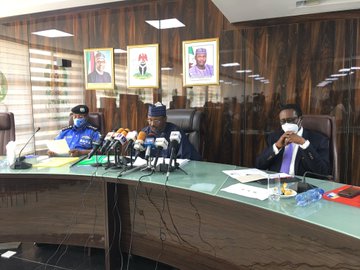Politics
INEC removes 749 Polling Units from shrines, royal palaces – announce dates for Ekiti, Osun guber polls

Ahead of the 2023 general elections, the Independent National Electoral Commission on Wednesday announced the creation of additional 56, 872 polling units across the country.
The Chairman of INEC, Prof. Mahmood Yakubu, stated this at a meeting with Resident Electoral Commissioners.
According to him, Nigeria now has a total of 176, 846 Polling Units from the initial 119, 973 following the conversion of voting points and voting points settlement to full-fledged Polling Units.
Yakubu said the commission had also removed 749 Polling Units from inappropriate facilities, with nine of them from shrines and several others from religious houses, royal palaces and private property.
“After wide-ranging consultations with stakeholders and fieldwork by our officials, the 56,872 voting points and voting point settlements were converted and added to the existing 119,974 Polling Units.
“Consequently, the commission is glad to report that 25 years since the current polling units were created in 1996, the hard nut is finally and successfully cracked after several unsuccessful attempts. Nigeria now has 176,846 full-fledged polling units,” he said.
Professor Yakubu stated that the history of creating and expanding polling units in Nigeria has been long and complex.
He explained that their adequacy and accessibility, in terms of number and location across the country, were some of the challenges that had to be addressed in the interest of credible elections.
The INEC boss said before 2010, the electoral umpire operated on a round figure of approximately 120,000 polling units.
He added that a census undertaken by the commission before the 2011 general elections arrived at the precise figure of 119,973 polling units.
Professor Yakubu disclosed that INEC has also made efforts to relocate many polling units from inappropriate places to public buildings accessible to voters, polling agents, observers, and the media during elections.
He listed some of the locations to include private residences and properties, palaces of traditional rulers, and places of worship.
The INEC Chairman attributed the establishment of voting points and voting point settlements across the states and the Federal Capital Territory (FCT) to the several unsuccessful attempts to create additional polling units.
“The voting points were tied to the existing polling units and voting point settlements. The number of registered voters in a polling unit and the voting point settlement in the FCT, was used to determine their voting points, based on the upper and lower thresholds of 500 and 750 voters respectively,” he said.
Yakubu, also said on Wednesday that the election in Ekiti will hold on June 18, 2022, while that of Osun will hold on July 16, 2022.
“In keeping with our policy of announcing the dates of elections in advance to enable early and effective preparations by all concerned, the Commission has approved that the Ekiti State Governorship election will hold on Saturday, June 18, 2022, while the Osun State Governorship election will hold one month later on Saturday, July 16, 2022,” he said.
Professor Yakubu added, “Looking to the near future, the Commission is preparing to conduct the remaining off-season end of tenure elections ahead of the 2023 general elections.
“Already, activities listed in the timetable for the Anambra State Governorship election are being implemented. So too are those of the FCT Area Council election holding on February 12, 2022.”
He informed the meeting that the detailed Timetable and Schedule of Activities for the two governorship elections have been uploaded on the website and social media platforms of the electoral umpire.
The INEC boss, therefore, appealed to political parties and aspirants to ensure rancour-free primaries and conduct peaceful electioneering campaigns.
He stated that the history of creating and expanding polling units in Nigeria has been long and complex, noting that their adequacy and accessibility, in terms of number and location across the country, were some of the challenges that had to be addressed in the interest of credible elections.






